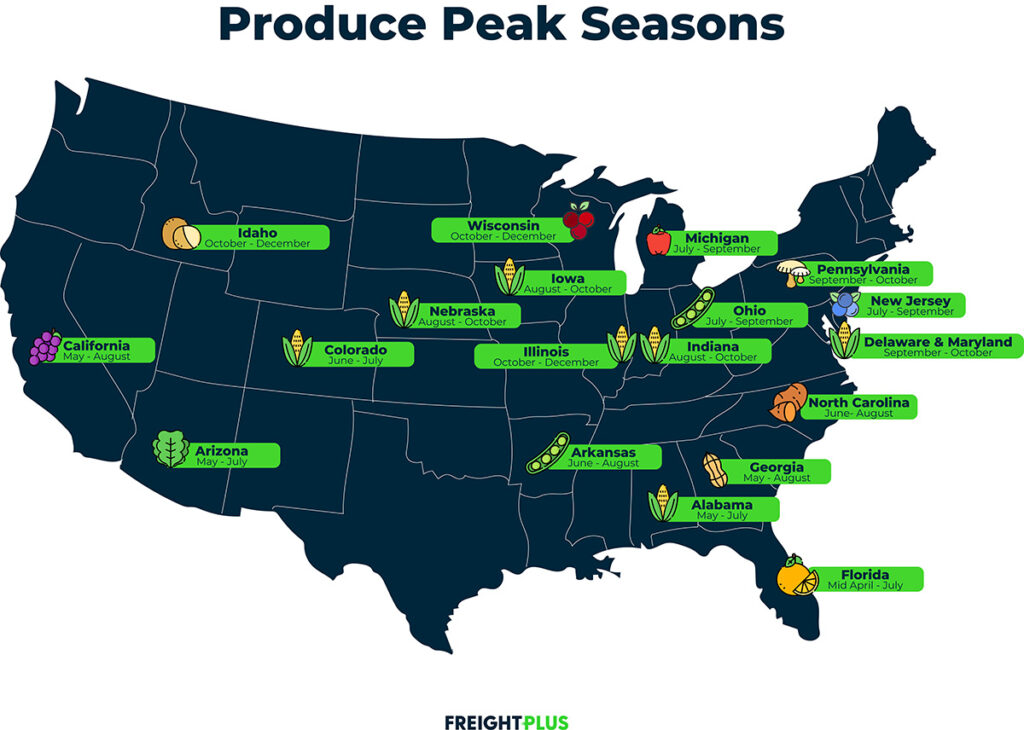If you’re a shipper who relies on refrigerated truckload freight, you’ve likely experienced the challenges of securing reefer capacity during produce season. Every year, from March through July, the demand for temperature-controlled freight surges as fresh produce moves from major growing regions to grocery stores, food service providers, and distribution centers across the country.
As a result, reefer capacity becomes limited, rates spike, and shippers without a solid transportation strategy face delays, increased costs, and less than satisfied customers. But don’t worry—there are ways to secure reliable reefer truckload capacity, even during the busiest months.
Why Reefer Capacity Tightens During Produce Season
Understanding why refrigerated freight capacity becomes scarce is the first step in planning ahead and securing trucks.Every produce season looks a little different depending on the region and the crop. The map below highlights key produce-growing areas across the U.S. along with their peak shipping timelines. Recognizing these regional patterns can help shippers better anticipate demand surges and proactively plan for capacity challenges.

Here are the main factors contributing to the produce season trucking crunch:
Increased Demand from Agricultural Shippers
During peak growing seasons in states like California, Florida, Texas, and Georgia, large volumes of perishable goods take priority in the market. Shippers moving produce have pre-booked capacity, leaving little room for last-minute freight.
Reefer Spot Rates Spike
Limited truck availability drives up reefer spot market rates. Carriers will prioritize the highest-paying loads, making it harder for shippers to secure cost-effective refrigerated truckload shipping unless they plan ahead.
Regional Disruptions Affecting Capacity
With reefer trucks concentrated in high-yield produce regions, other industries relying on refrigerated freight—including food & beverage manufacturers, pharmaceuticals, and frozen goods shippers—struggle to find available capacity.
Market Volatility
Seasonal freight fluctuations further tighten the market, making it critical to partner with a transportation partner that has strong carrier relationships.
5 Strategies to Secure Refrigerated Truckload Capacity During Peak Season
- Plan Ahead & Lock in Capacity Early
If you’re shipping perishable goods, waiting until the last minute to secure reefer truckload capacity is a risky move. Work with a transportation partner to forecast your seasonal shipping needs and lock in contract rates before demand spikes.
- Leverage a Transportation Partner with a Reliable Carrier Network
Transportation providers have relationships with refrigerated carriers nationwide and can help secure capacity, even in a tight market.
Having access to an extensive network of reefer carriers that specialize in produce, frozen foods, and other temperature-sensitive freight to ensure your shipments stay on schedule is key.
- Diversify Your Carrier Options
Relying on a single carrier during produce season can lead to major disruptions. Instead, work with a reliable transportation partner who can connect you with available reefer capacity when and where you need it most.
- Be Flexible with Pickup & Delivery Times
Carriers handling reefer freight during peak produce season often prioritize loads with flexible schedules. If you can adjust pickup and delivery windows, you may find it easier to secure truckload capacity at a lower cost.
- Leverage Team or Relay Drivers
To minimize delays and protect perishable goods from spoilage, consider incorporating team or relay drivers into your shipping strategy. This approach allows drivers to switch out at scheduled points along the route, keeping the truck in motion while staying within legal driving limits. The result? Faster delivery times, reduced detention, and less dwell time. Most importantly, it helps maintain the integrity of the cold chain—critical for temperature-sensitive freight. Relay driving can be a game-changer for shippers looking to improve reliability and efficiency during peak seasons or time-critical hauls.
How FreightPlus Helps Shippers Navigate Produce Season Constraints
At FreightPlus, we understand the challenges shippers face when reefer capacity tightens. Whether you’re moving fresh produce, frozen foods, or other temperature-sensitive freight, we provide customized logistics solutions to help secure truckload capacity, even during peak season.



